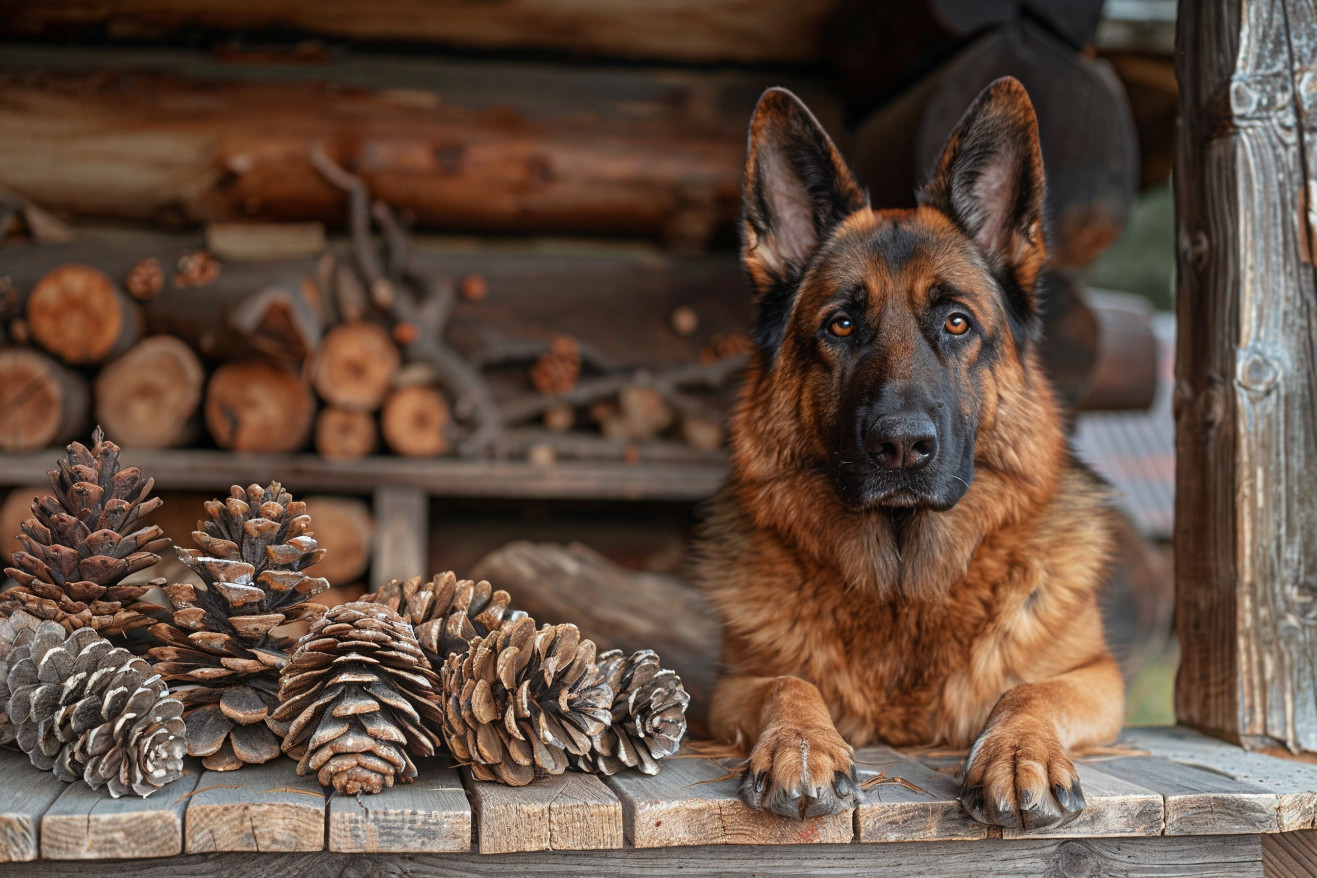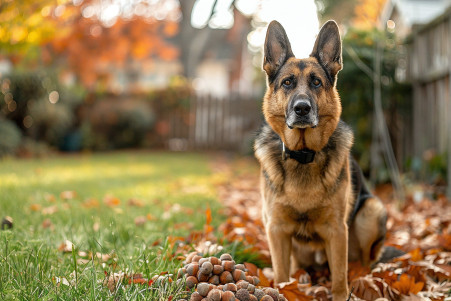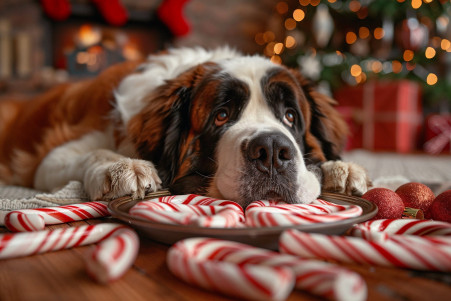Can Dogs Eat Pine Cones? The Benefits and Risks
30 March 2024 • Updated 29 March 2024

Dogs cannot eat pine cones. Although they are not poisonous, pine cones can lead to intestinal blockages or perforations if consumed because of their hard scales and wood-like material. Pine cones do not have any nutritional value for dogs. To prevent your dog from eating pine cones, it's best to keep them away from these objects.
Although pine cones are not safe for dogs to eat, we will look at scientific studies that have investigated whether different parts of pine trees can be used to improve dogs' diets or health. By learning about the chemical composition and effects of different pine components, you can learn which ones are safe for dogs to eat and whether there are any benefits or risks to consider. This information will help responsible pet parents decide whether to add natural pine-based products to their dog's diet or avoid them altogether.
Can dogs eat pine cones?
Potential Health Risks of Eating Pine Cones
If a dog is allowed to eat a pine cone, it can result in a number of health problems, some of which can be very serious. According to veterinary advice cited by JustAnswer, the potential side effects of eating pine cones include gastrointestinal upset, vomiting, diarrhea, lethargy, and loss of appetite. The hard, sharp texture of pine cones can also cause intestinal blockages or obstructions that may need to be surgically removed, as noted in another answer on the site.
Just as dangerous are the potential internal injuries that can be caused by the sharp scales and spines of pine cones. As MyHuskyExperience.com explains, these hard pieces can puncture or lacerate a dog's sensitive digestive system, leading to infections and other problems. In addition, some dogs may be allergic to the compounds in pine cones, such as pine oil, and have an allergic reaction that causes symptoms like difficulty breathing, swelling, and coughing, which are signs of anaphylaxis and require immediate medical treatment.
While the risks of eating pine cones depend on a number of factors, such as the size of the pine cone and the dog's breed, no dog owner should take the potential side effects lightly. It's important to keep a close eye out for symptoms like severe vomiting, bloody diarrhea, and abdominal pain or bloating after a dog has eaten a pine cone. In some cases, getting medical treatment quickly can save a dog's life, which is why it's so important to be aware of the potential dangers of these seemingly harmless natural objects.
What to Do If Your Dog Eats a Pine Cone
If a dog eats a pine cone, it’s important for the owner to call their vet right away, according to Doggie Blog. The owner should also keep a close eye on the dog for symptoms like vomiting, constipation, and abdominal pain. To help the pine cone pass, the dog’s water and fiber intake can be increased, according to a response on JustAnswer.
If the dog is experiencing severe symptoms like excessive vomiting or diarrhea, which could be a sign of a serious blockage, it’s important to get the dog to an emergency vet right away. According to Doggie Blog, getting the dog prompt medical attention can help stabilize the dog and minimize the impact of any issues related to the pine cone.
Of course, the best way to deal with the risks associated with pine cone ingestion is to prevent it from happening in the first place. This can be done by keeping dogs on leashes, removing pine cones from their environment, and training them not to eat foreign objects. By taking these steps, pet owners can help ensure their dogs don’t face the potential dangers of eating pine cones.
Safe and Healthy Chew Alternatives for Dogs
Although pine cones are not safe for dogs to chew on, there are many other safe and healthy chew alternatives that can help dogs meet their natural chewing needs. According to the Tall Tails Natural Rubber Reward Toys for Dogs product page, rubber or nylon chew toys that are made specifically for dogs can provide a safe and durable option. These toys can provide the same chewing experience as pine cones without the risk of internal injury or blockage.
For dogs that prefer edible chews, veterinary professionals recommend chew options that are made with natural ingredients, such as deer antlers or bully sticks. In addition, treat-dispensing puzzle toys can help dogs stay mentally stimulated and redirect their chewing behavior in a positive direction. By ensuring that dogs have access to safe and healthy chew options, pet owners can help prevent them from chewing on dangerous items like pine cones.
In the end, being a responsible pet owner means not only keeping dangerous items out of a dog's reach, but also helping them develop healthy chewing habits through training and supervision, as noted by the product information from Tall Tails. By providing safe and engaging alternatives, dog owners can help their pets live long, healthy, and happy lives.
Dangers of Pine Needle Consumption in Dogs
In addition to the dangers of pine cones, pine needles can also be a hazard for dogs if they are consumed. According to Healthy Paws Pet Insurance, pine tree needles can puncture the soft tissues that line a dog's digestive tract, and in some cases, they can work their way into the tissue and cause deep infections and abscesses. Pine needles can also form a mass in the stomach or intestines, which can cause the dog to vomit, gag, retch, and display other symptoms of distress.
In addition to these gastrointestinal problems, Hepper notes that pine needles can also cause injuries to a dog's mouth, throat, and paws. The sharp needles can puncture the skin and cause painful infections. The pine oil in the needles can also lead to skin issues and allergic reactions, including irritation, redness, swelling, and in severe cases, difficulty breathing.
As Dogster points out, while pine needle consumption is not common, the potential problems are serious. If a dog has been exposed to pine needles and is showing any concerning symptoms, it's important to get them to a vet right away. The best way to keep dogs safe from these natural but dangerous holiday decorations is to be aware and take steps to prevent exposure.
Investigating Pine Cone Nutrition
While pine cones themselves are not nutritious for dogs, some parts of pine trees may have health benefits. The young, tightly closed green cones are edible for humans, and pine pollen is full of antioxidants, amino acids, and micronutrients. Pine cones are also a good source of dietary fiber and vitamin C in some cultures, where they are ground into a flour substitute.
That said, pine cones are not recommended for dogs to eat, even though they are not toxic, because, as noted by Dogster, their hard exterior and spines can be indigestible and even dangerous. The potential for intestinal blockages and other health problems is too great to make them a safe and healthy option for dogs. Therefore, while pine cones may have some nutritional value for people, they should not be given to dogs as a food source.
Differences in Pine Cone Risks Between Pine Tree Species
Although the risks of pine cone consumption are similar between different pine tree species, there may be some species that are more dangerous to dogs than others. For example, the Coulter pine from southern California has cones that are particularly large and spiky, and can weigh up to 11 pounds, according to Britannica. If a dog were to swallow one of these massive "widow-maker" cones, it could potentially cause more serious damage.
In addition, some pine tree species may have higher levels of toxic compounds like terpenes in their needles and cones, as is the case with the Miniature Pine Tree, which can cause gastrointestinal upset, liver failure, and central nervous system depression in dogs, according to Greg.app. The pine needles are also sharp and could cause damage to a dog's digestive system.
That said, while there may be some differences in the risks posed by pine cones from different species of pine trees, due to their physical characteristics, all pine cones should be considered a potential hazard to dogs, regardless of the species of tree they come from. The best way for dog owners to keep their pets safe is to make sure they don't have access to any kind of pine cone. It's important to be vigilant and take a proactive approach to ensure dogs are protected from the risks these natural objects can pose.
Conclusion: Protecting Your Pet From Pine Cone Hazards
Pine cones can cause serious health problems for dogs if they eat them, including obstructions, punctures, and allergic reactions. Although they're not toxic, pine cones don't have any nutritional value for dogs and should be avoided as a food source. If a dog eats a pine cone or shows any concerning symptoms, it's important to get them to the vet as soon as possible.
Providing dogs with safe, healthy chew options can help prevent them from seeking out dangerous items like pine cones. Being aware of potential hazards and taking steps to protect dogs from them is an important part of being a responsible pet owner.


